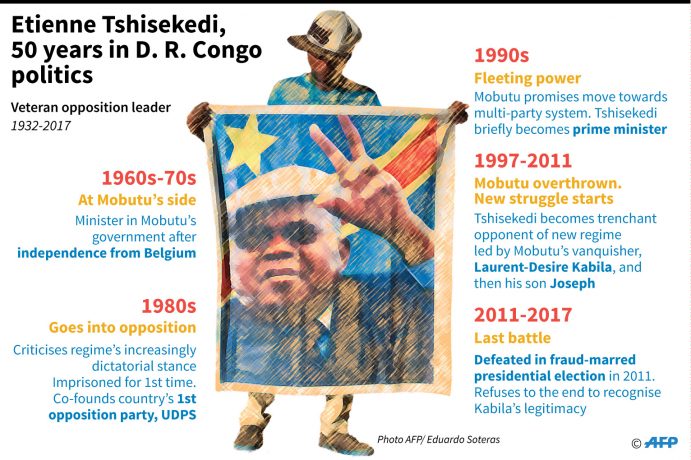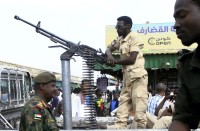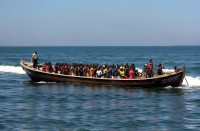
by Bienvenu-Marie BAKUMANYA
Agence France-Presse
KINSHASA, DR Congo (AFP) – Volatile Congo faced uncertainty Thursday after the death of Etienne Tshisekedi, the veteran politician who recently banded the opposition together to end President Joseph Kabila’s rule of the mineral-rich nation.
Business was slow and some shops closed in Democratic Republic of Congo’s usually bustling capital of 10 million people, Kinshasa, where large crowds gathered around Tshisekedi’s home and the headquarters of his UDPS party.
Kabila, who has ruled the vast unruly nation for 16 years, refused to step down on completing his final mandate in December, but then struck a power-sharing deal with the opposition that provides for elections late this year.
“There should be a week of national mourning to pay him homage,” said taxi-driver Adonis Matondo.
Tshisekedi died Wednesday aged 84 in Brussels, where he had been flown for medical treatment January 24 just as talks were scheduled to end the nation’s months-long political crisis.
The burly politician, who in the 1960s received the country’s first doctorate in law, had been ill for some time, receiving treatment in Belgium, the former colonial power.
Talks in limbo
After two years there he returned to DR Congo in July, where hundreds of thousands of people took to the streets to welcome him home.
He was a veteran politician, the ally-turned-enemy of despot Mobutu Sese Seko, then the rival to the father-son Kabila dynasty. He opposed Laurent Kabila when he took over from Mobutu in 1997, then Joseph who stepped in on his father’s assassination in 2001.
A spokesman for the ruling parties, Andre-Alain Atunda, paid tribute to his “combat for democracy”.
Exiled millionaire and potential presidential candidate Moise Katumbi hailed his peaceful fight for democracy and dubbed him “one of the leading figures of our country’s history.”
The opposition coalition he put together recently is headed by his Union for Democracy and Social Progress (UDPS) and is supposed to be negotiating the next steps in the New Year’s Eve power-sharing deal agreed with Kabila.
Brokered by the country’s influential Roman Catholic bishops, the deal means that Kabila can remain in office until elections in late 2017, in tandem with a transitional body and a new premier, who is yet to be agreed.
But the talks aimed at avoiding all-out conflict in the country of 71 million people appear to be in limbo, with no progress reported in recent weeks.
‘The worst time’
Tshisekedi’s death “comes at the worst time for the establishment of the new transition,” Thierry Vircoulon, an eminent Paris-based Congo analyst and academic, told AFP.
“Tshisekedi was supposed to have chaired the Transition Council and they will now have to agree on a new opposition figure though there is already disagreement on who should be the premier,” added Vircoulon.
Tshisekedi’s death also leaves this year’s planned elections “increasingly jeopardised”, he added.
Voters in DR Congo were originally to have chosen a new president in 2016, but the authorities had said the electoral registers must be revised, a huge enterprise in a country almost the size of western Europe.
And in a highly controversial ruling, the constitutional court had said Kabila could remain in office until an election was held.
Kabila, 45, has been in power in one of the least developed countries in the world, since the 2001 assassination of his father Laurent at the height of the Second Congo War.
Belgian Foreign Minister Didier Reynders described Tshisekedi as a “remarkable political figure”.
His “last fight (…) for the constitution and democracy culminated in the New Year’s Eve agreement,” Reynders said in a statement, adding that “Belgium joins … the Congolese people in their grief and their desire to see his work bear fruit”.






